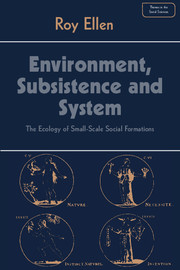Book contents
- Frontmatter
- Contents
- Preface
- Acknowledgements
- 1 ENVIRONMENTAL DETERMINISM AND CAUSAL CORRELATION
- 2 POSSIBILISM AND LIMITING FACTORS
- 3 CULTURAL ECOLOGY AND THE EXPLANATORY IMPERATIVE
- 4 HUMAN ECOLOGY AND THE BIOLOGICAL MODEL
- 5 THE FLOW OF ENERGY AND MATERIALS
- 6 ECOSYSTEMS AND SUBSISTENCE PATTERNS I
- 7 ECOSYSTEMS AND SUBSISTENCE PATTERNS II
- 8 SYSTEMS AND THEIR REGULATION
- 9 INFORMATION AND THE MANIPULATION OF THE ENVIRONMENT
- 10 ADAPTATION: A SUMMARY AND RECONSIDERATION
- 11 THE REPRODUCTION AND EVOLUTION OF SOCIAL AND ECOLOGICAL SYSTEMS
- 12 ECOLOGY IN ANTHROPOLOGICAL METHOD AND THEORY
- Notes
- Bibliography
- Name Index
- Subject Index
4 - HUMAN ECOLOGY AND THE BIOLOGICAL MODEL
Published online by Cambridge University Press: 05 June 2012
- Frontmatter
- Contents
- Preface
- Acknowledgements
- 1 ENVIRONMENTAL DETERMINISM AND CAUSAL CORRELATION
- 2 POSSIBILISM AND LIMITING FACTORS
- 3 CULTURAL ECOLOGY AND THE EXPLANATORY IMPERATIVE
- 4 HUMAN ECOLOGY AND THE BIOLOGICAL MODEL
- 5 THE FLOW OF ENERGY AND MATERIALS
- 6 ECOSYSTEMS AND SUBSISTENCE PATTERNS I
- 7 ECOSYSTEMS AND SUBSISTENCE PATTERNS II
- 8 SYSTEMS AND THEIR REGULATION
- 9 INFORMATION AND THE MANIPULATION OF THE ENVIRONMENT
- 10 ADAPTATION: A SUMMARY AND RECONSIDERATION
- 11 THE REPRODUCTION AND EVOLUTION OF SOCIAL AND ECOLOGICAL SYSTEMS
- 12 ECOLOGY IN ANTHROPOLOGICAL METHOD AND THEORY
- Notes
- Bibliography
- Name Index
- Subject Index
Summary
Some of those to whom I have attached the labels of environmentalism, possibilism and cultural ecology may have been inspired in their work by biological parallels. However, their Aristotelian assertion of the uniqueness of human culture, its dominance as an organizing concept, and its total analytical independence was certainly not conducive to an explicitly ecological approach to ethnographic analysis. Much of the early work was based on broad natural historical and evolutionary notions and was either indifferent to, or ignorant of, the rapidly developing disciplines of animal and plant ecology.
BIOLOGICAL AND HUMAN ECOLOGY
From the eighteenth century onwards ‘normal’ natural science had become increasingly non-Aristotelian in its organic view of the relationships between entities. This view was dramatically re-affirmed in Darwinism through the concepts of the interconnectedness of living matter and the ‘struggle for existence’. The former became the basic meta-concept of a science of ecology (Glacken 1967:422), giving rise to a new definition of environment which included all factors external to the organism and provided for a highly complex set of conditions and adaptations. It was concerned with life as a system of dynamic interdependences, every organism being in a constant state of adjustment and readjustment to its external environment (topography, climate, other organisms and their activities). In short, it was concerned with what Haeckel saw as the universal life triad of environment, function and organism, and it was Haeckel who also appears to have been the first to use the term ‘ecology’ (Ökologie) (Haeckel 1911(1868):793–4).
- Type
- Chapter
- Information
- Environment, Subsistence and SystemThe Ecology of Small-Scale Social Formations, pp. 66 - 94Publisher: Cambridge University PressPrint publication year: 1982



